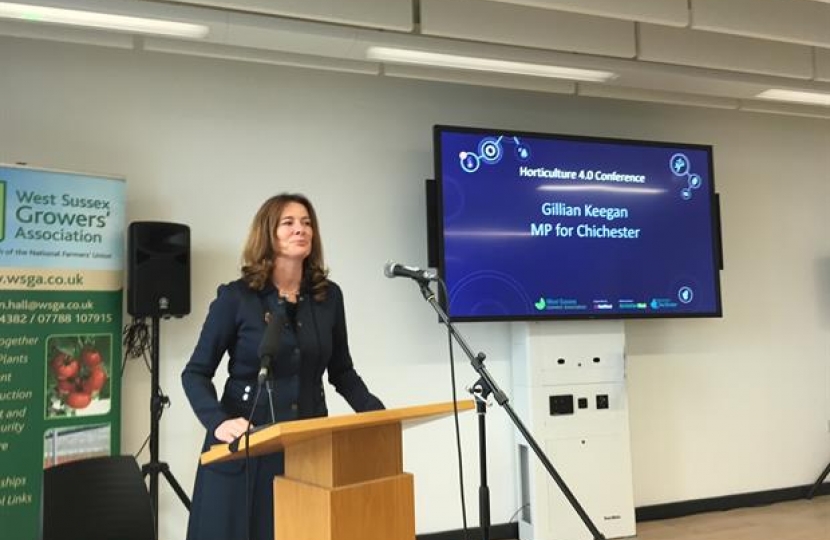
Chichester MP Gillian Keegan has indicated the 2,500 worker SAWs scheme could be a trial for a wider plan, while NFU horticulture chairman Ali Capper has said with robotics still several years away, more seasonal workers are needed urgently now and post-Brexit.
Both were speaking at the West Sussex Growers Association Horticulture 4.0 conference at the Univeristy of Chichester which looked at the role of automation and robotics in horticulture.
Speakers told a packed audience of production professionals that change was rapid as the industry adapts to worker shortages by looking at mechanisation.
Keynote speaker Keegan said: "Access to labour - there have been some difficulties this year, mostly due to exchange rates. We need a long-term future immigation policy."
She said the 2,500 pilot Seasonal Workers (SAWS) scheme must be grown. As the previous SAWS was 20,000-30,000 "we do have previous knowledge of what the what the requirements are".
Picking 15 to 19kg an hour was "nothing like unskilled labour", as this year's MAC enquiry, which dismissed calls for more unskilled labour immigration, said it was when recommending no concessions for unskilled labour for the industry. "It's highly skilled but difficult to define". Delays at the border would be a "disaster".
Keegan said she was impressed by West Sussex growers' moves into LEDs and hydroponics and other technology. She said workers were needed "pretty much all the year" now.
She said the Government hoped to have a Brexit agreement before Christmas, but the 5% that needed to be agreed was "critical", especially the "sensitive" Northern Ireland border issue.
The best way for agriculture is the common rule book with free trade - "a business-friendly, low risk Brexit" but she agreed some of her colleagues are not fully behind the Prime Minister's Chequers plan, though "post-Brexit is a huge opportunity".
However, while Keegan could say SAWS should grow, the view at the Home Office is more important, said the NFU.
NFU horticulture board chairman Ali Capper said the Government was now collecting its own figures and the worker shortfall was 29% in August, after being 29% at the previous peak in September 2017. Capper said the Government trusts its own figures, but they tally with NFU statistics and the result is that crops were being left unpicked.
But there is a "chink in the door" on immigration policy in the SAWS pilot "but we need 8,000-10,000". All other EU countries have schemes and the UK is at a disadvantage. A Brexit deal would mean 2,500 could become 10,000 quickly, but no deal would mean 70,000 seasonal workers are needed.
However, labour provider HOPS say they have cut waiting lists to far less than the NFU figure after "transferring sign-up costs from workers to growers, making UK jobs more attractive to workers. Concordia has followed suit for 2019.
Both HOPS and Concordia have applied to run the new SAWS scheme.
Capper said defining 'skills' such as picking, thinning and husbandry in horticulture was difficult. She is "fed up" that horticulture is branded a "low productivity sector".
University of Lincoln's Simon Pearson said robots were at least five years away, but Westminster University's Matthew Howard said there were affordable robots available now.
Meanwhile Neame Lea's Andrew Fuller gave examples of how the nursery had cut staffing by 80% on cut flower tulip lines through computer-controlled grading. There are 12m tulips now produced with a capacity of 60m and lilies starting this year.
Centralised operations meant labour needed to be more technically skilled: "We have to reduce labour but we do need more technically able workers. We don't really have this at the moment."
Consultant Martin Collison said digitisation will "revolutionise horticulture production and supply chains".
University of Plymouth's Martin Stoleon is trialling 'Gummi Arm' robots to pick raspberries, tomatoes and cauliflowers.
Dave Thompson of Ricardo engineers talked about the automated 'Factory 4.0' where actions that do not add value are eliminated by adding technology such as digital screens to advise workers to work accurately. He said smart factory was about AI, cognitive computing and 'smart co-acts', and followed steam, electricification and IT as industry revolutions.
Read: https://www.hortweek.com/seasonal-workers-required-urgently-robotics-de…
